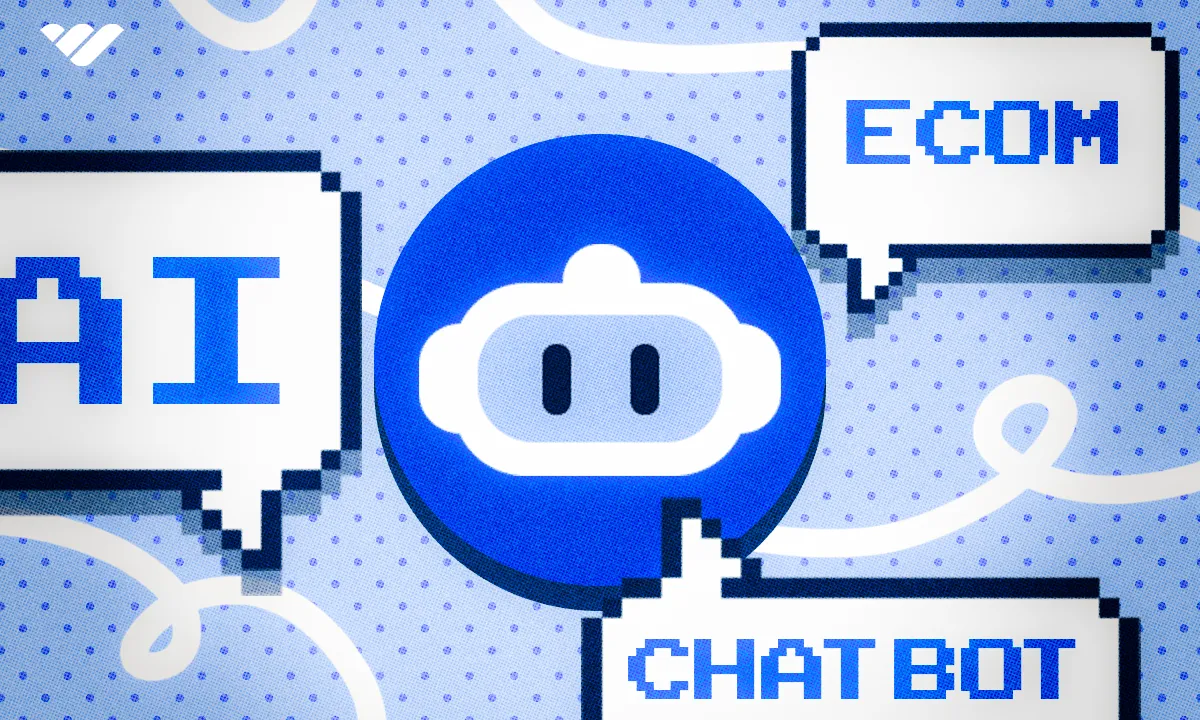In this article, we’ll explore what chatbots are, how they work, and present a list of the best AI chatbots for ecommerce. Keep reading to find the best solution for your site.
Key takeaways
- AI chatbots deliver 24/7 customer support and personalized shopping guidance, boosting conversion rates and reducing support team workload.
- Modern ecommerce chatbots learn from interactions over time, providing increasingly accurate and personalized responses to customers.
- Choosing the right chatbot depends on your business size, budget, and channel needs—options range from $15/month to enterprise-level solutions.
Today, shopping in a physical store is more of a way to pass the time rather than efficiently pick up necessities. With the rise of online shopping, customers can search for products and buy what they want anywhere, anytime.
This convenience for customers has become a challenge for online sellers, as questions about the products or services could come in at any time and they need to be answered as quickly as possible or you risk losing sales. This is where AI chatbots come in.
In this article, we’ll explore what chatbots are, how they work, and present a list of the best AI chatbots for ecommerce in 2026. Keep reading to find the best solution for your site.
What is an AI Chatbot?
An AI chatbot is a computer program that uses artificial intelligence to simulate human conversation. These chatbots are designed to interact with users either through text (most commonly) or voice to assist with various tasks including answering questions or guiding users through processes.
AI chatbots leverage technologies like machine learning, natural language processing (NLP), and sometimes deep learning to understand and interpret user inputs more accurately. Most AI chatbots learn from past interactions, improving over time to provide more accurate or personalized responses.
In ecommerce, AI chatbots are used to enhance customer service, automate tasks like order tracking or product recommendations, and provide real-time assistance to users, improving the overall shopping experience.
How Do AI Chatbots Work?
A chatbot works by using a combination of artificial intelligence, a process called natural language processing (NPL), and sometimes machine learning to simulate conversations and interact with users. Specifically in ecommerce, chatbots have functions like:
Providing 24/7 Customer Service
AI chatbots are programmed to understand and respond to customer queries, providing support at any time regardless of time or location. When a user types a question, the chatbot breaks down the input, identifies keywords, and interprets the context to determine the best response.
For example, with questions like "How much does item X cost?" or "How long does shipping take?," the chatbot pulls from a knowledge base or FAQs to deliver an accurate answer almost instantly.
This immediate response not only saves time for customers, but also reduces the load on human support teams.
Creating an Interactive Customer Experience
AI chatbots can transform static websites into dynamic, engaging platforms by guiding customers through personalized shopping experiences. For instance, if a customer is looking for a specific product, the chatbot can ask for preferences such as price range or product type.
Also, chatbots can interact with users by asking them questions, offering product suggestions, or even helping them navigate various site features. This interactive customer experience can lead to higher conversion rates as customers receive direct, helpful guidance throughout their journey.
Offering Post-Sale Support
Once a customer has made a purchase, AI chatbots continue to offer support by helping with common post-sale tasks like tracking orders, handling returns, and answering questions about warranties.
After a sale, the chatbot can automatically send updates regarding order status and delivery. If an issue arises, such as a delayed shipment or the need for a return, customers can interact with the bot to resolve the matter quickly, and it may even initiate troubleshooting for certain products, offering step-by-step guidance to address common post-sale problems without human intervention.
Learning and Improving
The cool thing about chatbots is that they can learn from user interactions. If a more advanced chatbot encounters a new question or a phrase it doesn’t understand, it can improve its understanding by gathering more data or receiving feedback from human agents.
Chatbots can be integrated into ecommerce platforms, enabling them to access real-time information (such as customer order history, inventory levels, or shipping status) and provide detailed, personalized responses.
The Best AI Chatbots for Ecommerce
There are so many chatbot options for ecommerce, but choosing the right one will depend on the size of your business, what it sells, and its target audience. Here are some of the best AI chatbots for ecommerce (in no particular order):
1. Tidio
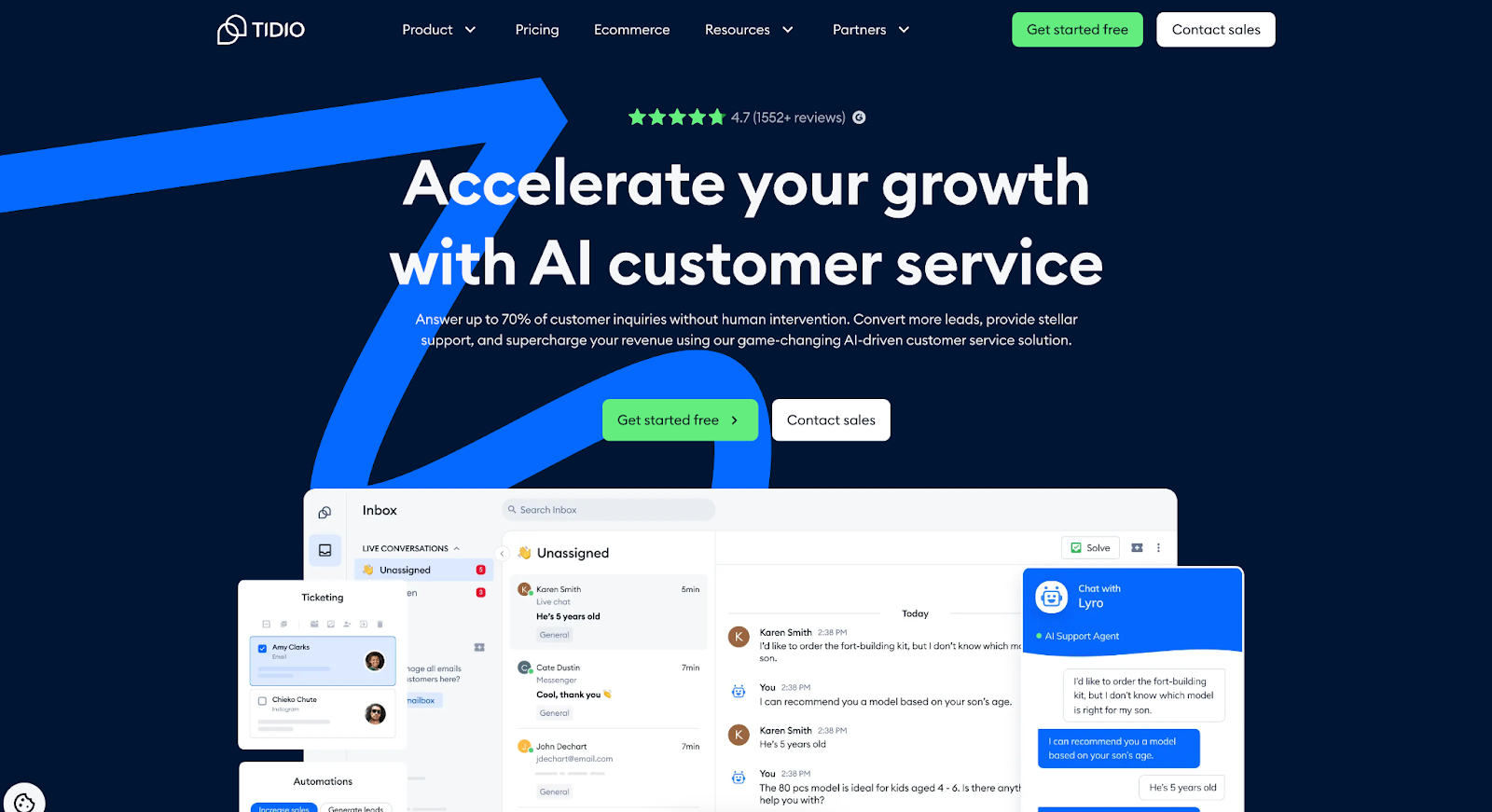
Tidio combines live chat, chatbot, AI agent, and help desk features into one platform, making it a strong choice for businesses that want to provide instant customer support and automate responses. Its AI-powered chatbot can answer common questions, qualify leads, and even recommend products in real time, which helps businesses save time while improving customer experience.
Tidio also integrates with popular ecommerce platforms like Shopify, WooCommerce, and BigCommerce, enabling seamless communication with online shoppers. With its visual chatbot builder, even non-technical users can create automated workflows to handle inquiries, recover abandoned carts, or nurture leads.
Pros:
- Easy-to-use chatbot builder.
- Integrates well with ecommerce platforms.
- Combines live chat, chatbot, and helpdesk in one tool.
Cons:
- Enterprise clients may have access to all advanced productivity tracking metrics.
Best For: Small eCommerce businesses looking for affordable live chat and chatbot solutions.
Pricing: Tidio offers a free plan with basic live chat and chatbot features. Paid plans include Starter ($29/month), Growth ($59/month), Plus ($749/month), and Premium.
2. Intercom
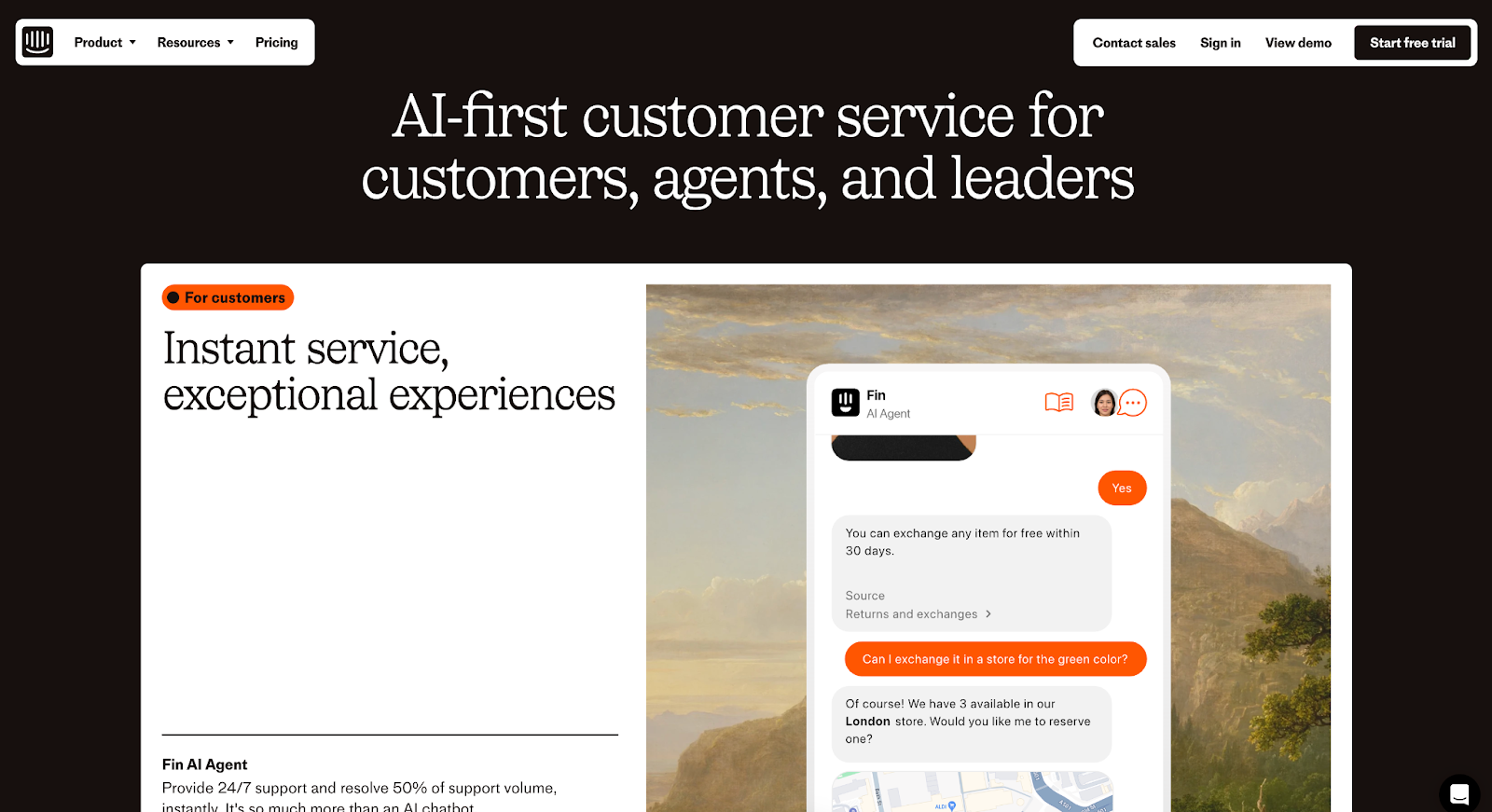
A powerful tool for personalized customer engagement, Intercom’s AI chat system tracks user behavior, enabling it to send targeted messages based on specific actions or past interactions. This kind of personalization makes it easier to nurture leads and convert them into customers.
Additionally, Intercom provides strong automation for customer service, enabling companies to promptly address typical problems while maintaining a human touch. With its integrated analytics, businesses can monitor engagement metrics and modify chatbot behavior to continuously enhance the client journey.
Pros:
- Great for user tracking and targeting.
- Offers advanced automation for support.
- Built-in analytics for optimization.
Cons:
- Many of its main features are exclusive to more expensive plans.
- Requires setup and ongoing customization for maximum effectiveness.
Best For: Companies looking for personalized, data-driven customer interactions and long-term engagement.
Pricing: Intercom offers a 14 days free trial, but it has three plans: Essential ($25 per month, or $468 a year), Advanced ($85 per month, or $1,188 a year), and Expert ($132 per month, or $1,168 a year).
3. ManyChat
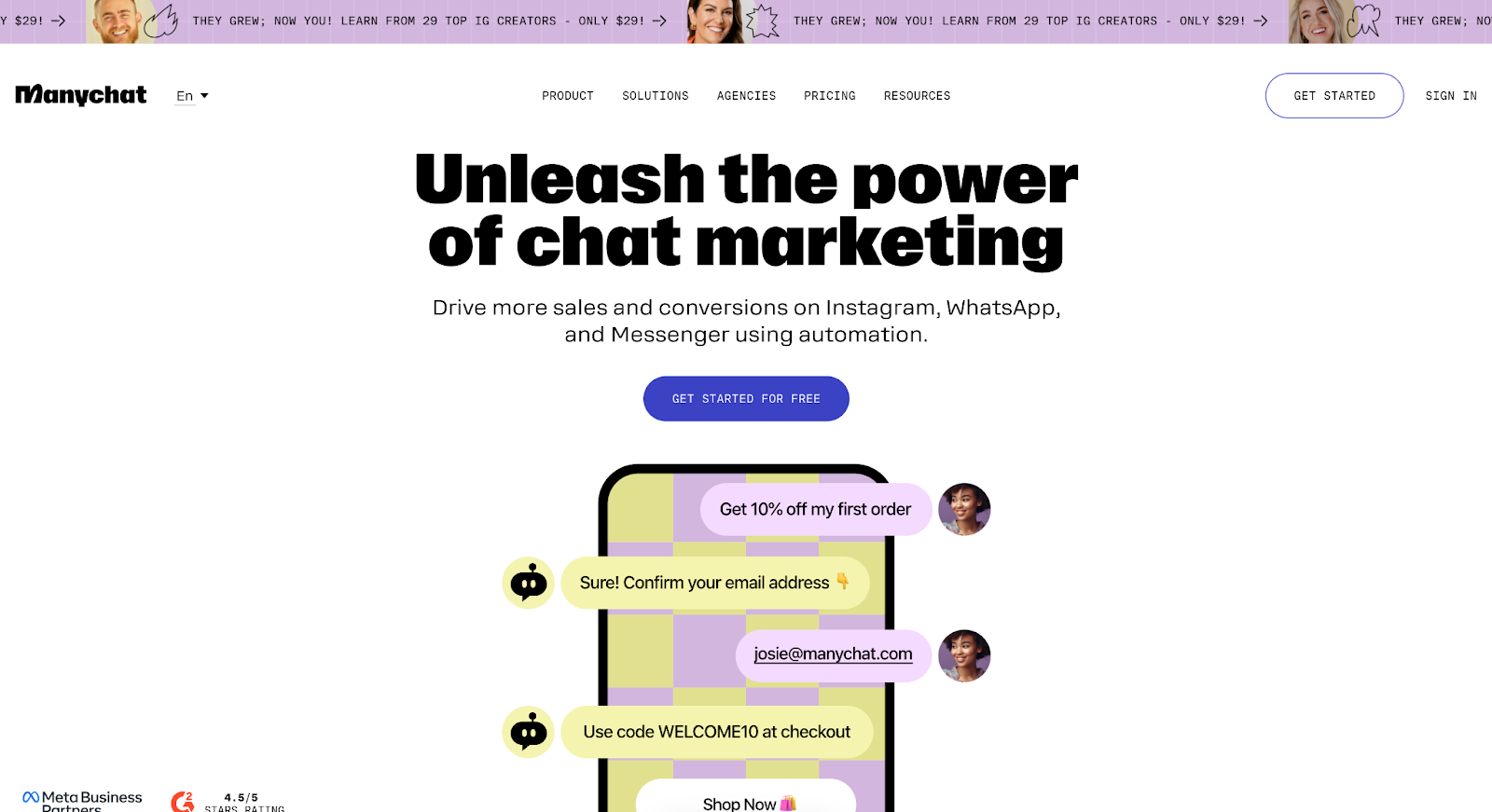
ManyChat stands out for its multi-channel capabilities, smoothly integrating with platforms like Facebook Messenger, Instagram, WhatsApp, and even email. This makes it ideal for businesses that want to engage with customers across multiple platforms, without any potential customers slipping through the cracks.
Its drag-and-drop builder allows for easy setup and automation of flows without needing any coding skills. ManyChat can also be fully integrated with ecommerce platforms like Sellfy, helping with the automatization of marketing across multiple channels.
Pros:
- Simple, no-code setup.
- Supports multiple messaging channels.
- Excellent for automating social media interactions.
Cons:
- Lacks advanced features compared to enterprise-level tools.
Best For: Businesses focused on multi-channel communication and marketing automation.
Pricing: ManyChat has a Free plan, and a Pro subscription plan ($15 per month). There’s also the option to customize your Manychat experience to meet your business goals, the pricing changes according to the features you choose.
4. Chatfuel
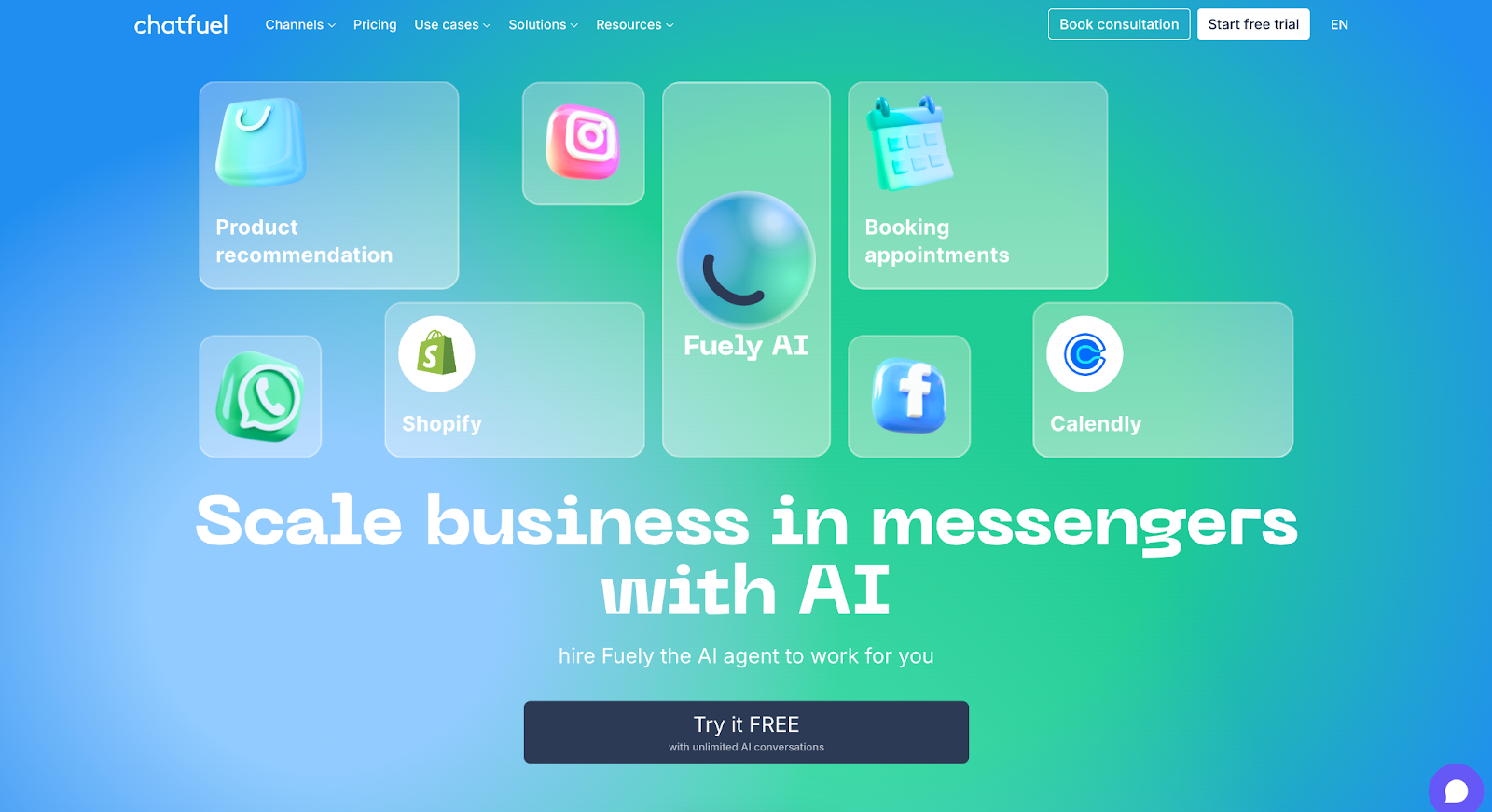
Specifically designed for Facebook, Instagram, and WhatsApp, Chatfuel offers an intuitive, no-code chatbot builder, allowing users to quickly create AI-driven conversations that can guide customers through purchases, answer questions, or provide product recommendations. The platform’s AI learns from interactions, improving responses over time.
One great feature of Chatfuel is that it also includes analytics, giving businesses insight into how well the chatbot is performing and where improvements can be made. The bot can handle complex conversation flows, making it a solid choice for both big and small businesses.
Pros:
- Easy setup with no coding required.
- Perfect for small and medium businesses.
- Offers performance tracking with analytics.
Cons:
- Limited to Meta platforms.
- Lacks advanced features for larger enterprises.
Best For: Businesses needing a quick and easy-to-use chatbot solution for Facebook Messenger, Instagram, and Whatsapp with advanced automation and solid analytics to measure performance.
Pricing: Chatfuel has different plans divided between Facebook & Instagram, and WhatsApp. For Facebook & Instagram we have the Business plan ($19.99 monthly) and the Enterprise plan ($300 monthly). For WhatsApp there’s the Business plan (around $50) and Enterprise (around $300 per month).
5. LivePerson
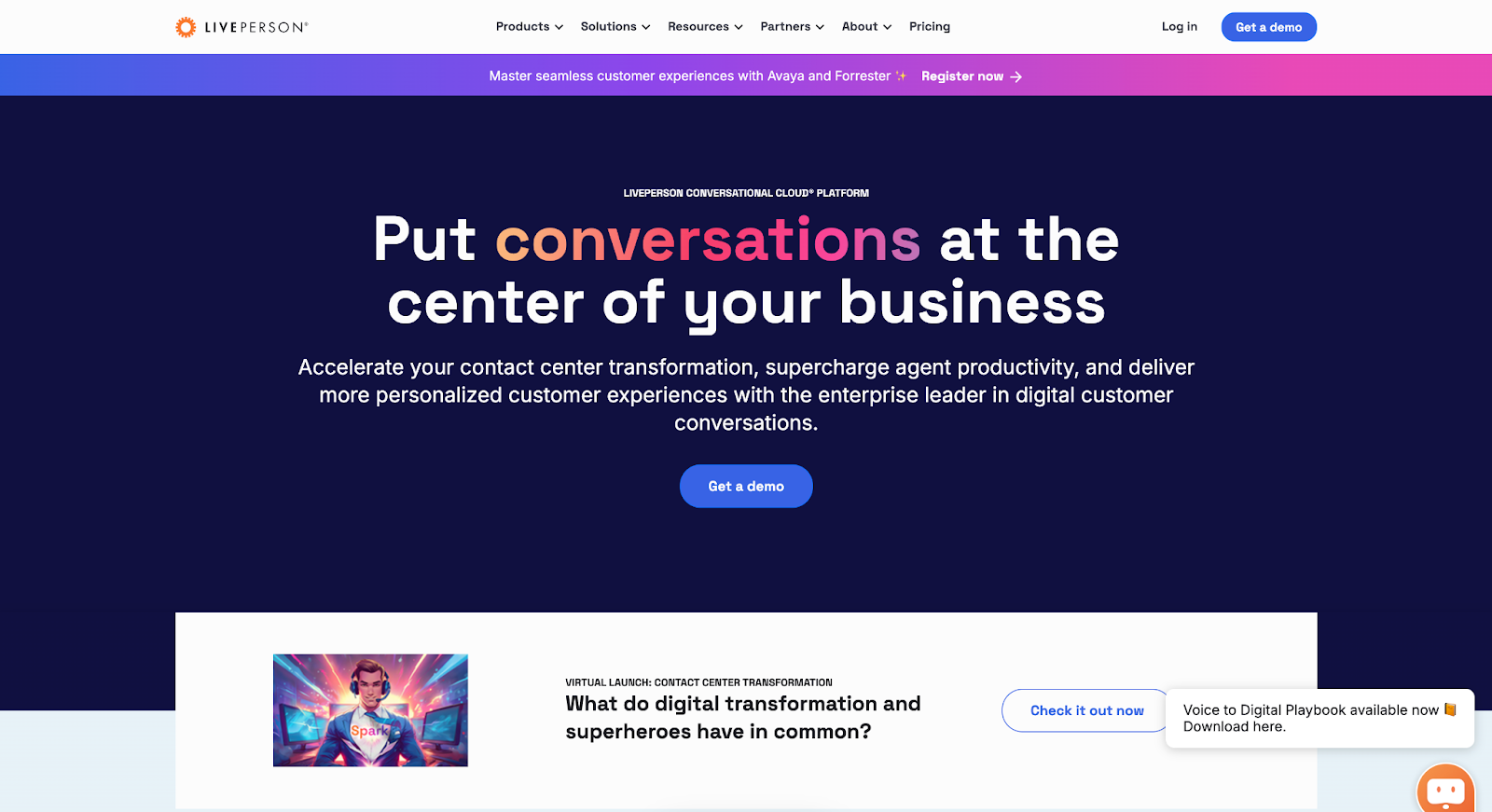
LivePerson offers a comprehensive AI-powered chatbot that combines automated messaging with human assistance when necessary. What sets LivePerson apart is its ability to integrate conversational AI with human agents, offering a hybrid model that maximizes customer satisfaction.
The bot learns over time, providing more accurate and contextual responses, while analytics help businesses track and optimize performance. LivePerson supports several integrations with popular CRM and marketing platforms, allowing businesses to engage with customers across all phases of the buying journey.
Pros:
- Hybrid model combining AI with human assistance.
- Supports multiple communication channels.
- Offers in-depth analytics.
Cons:
- Pricing can be high for small businesses.
- Requires technical expertise for full customization.
Best For: Businesses seeking advanced AI capabilities with multi-channel customer support and engagement.
Pricing: Users must choose quotes within bronze, silver, and gold packages with pricing varying between each one and depending on the functions a company wants.
6. Pypestream
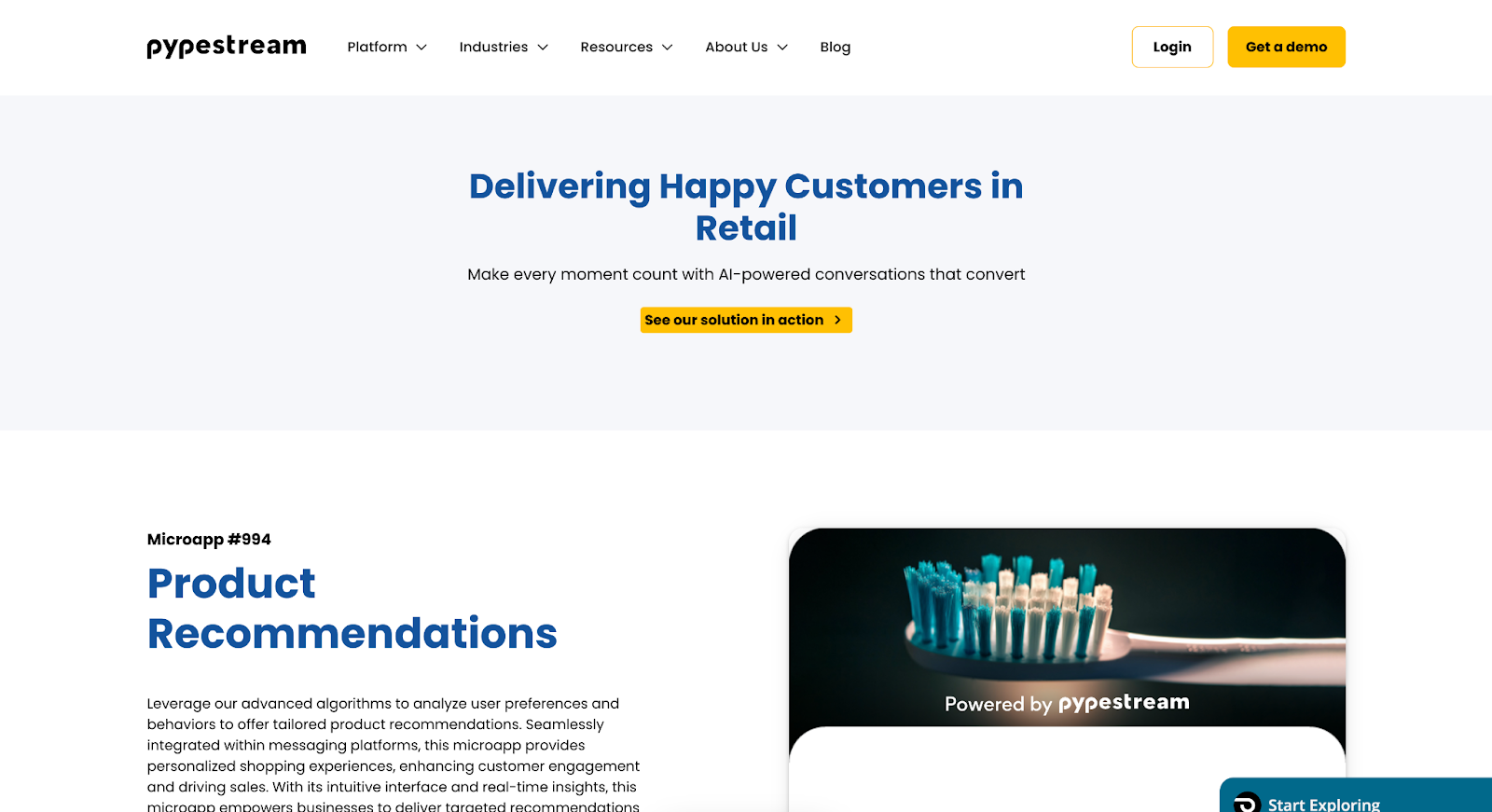
Pypestream is known for creating highly customizable chatbot experiences, from simple queries to intricate product support conversations. One of its major strengths is its ability to integrate deeply with existing CRM systems, giving businesses access to customer data for more personalized and informed interactions.
Pypestream's chatbots also offer the ability to handle billing queries, technical support, and sales questions without human intervention, making it a comprehensive solution for larger ecommerce businesses.
Pros:
- Highly customizable conversational experiences.
- Strong integration with CRM systems.
- Supports multimedia content.
Cons:
- More suited for larger enterprises.
- Requires technical knowledge for setup.
Best For: Enterprises seeking advanced automation for customer interactions, with strong CRM integration for personalization.
Pricing: Pypestream offers custom pricing based on the specific needs of a business, including features and the level of customization required.
7. ProProfs Chat
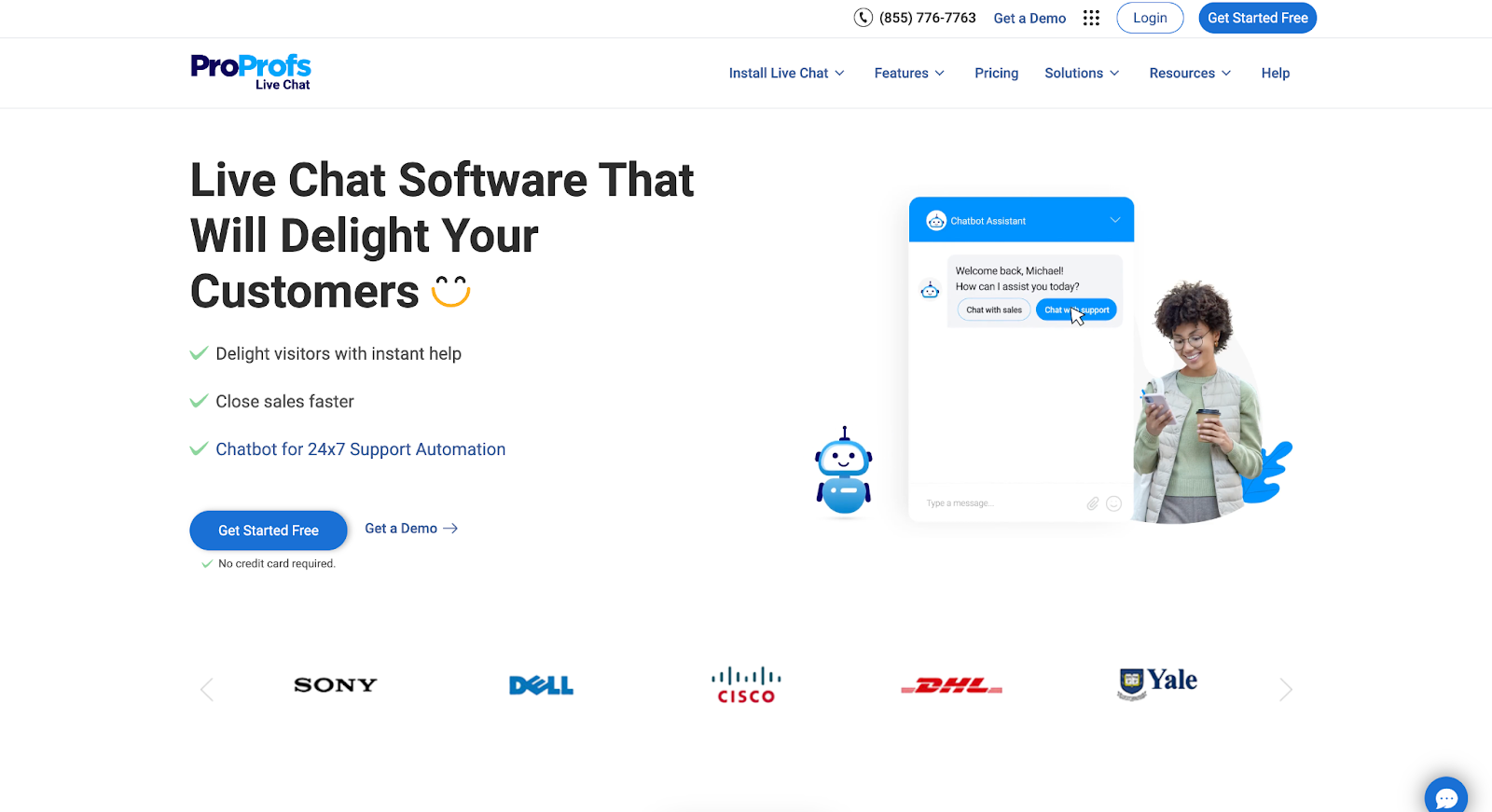
ProProfs Chat is a user-friendly chatbot platform designed to improve customer engagement by delivering instant responses to queries. Equipped with AI-driven automation, it allows businesses to provide 24/7 support while reducing response time.
It integrates well with popular CRMs and help desk tools, which helps streamline the support process. Its ease of customization allows users to create tailored experiences for different customer segments, also offering real-time monitoring features to check performance.
Pros:
- Simple to set up and customize.
- Great for real-time monitoring.
- Integrates with CRMs and help desks.
Cons:
- Limited advanced automation features compared to competitors.
- Lacks robust AI capabilities for handling complex queries.
Best For: Small to medium-sized businesses looking for an easy-to-implement, real-time chat solution.
Pricing: ProProfs has a Free Plan and a Team Plan ($19.99 per month).
8. Drift
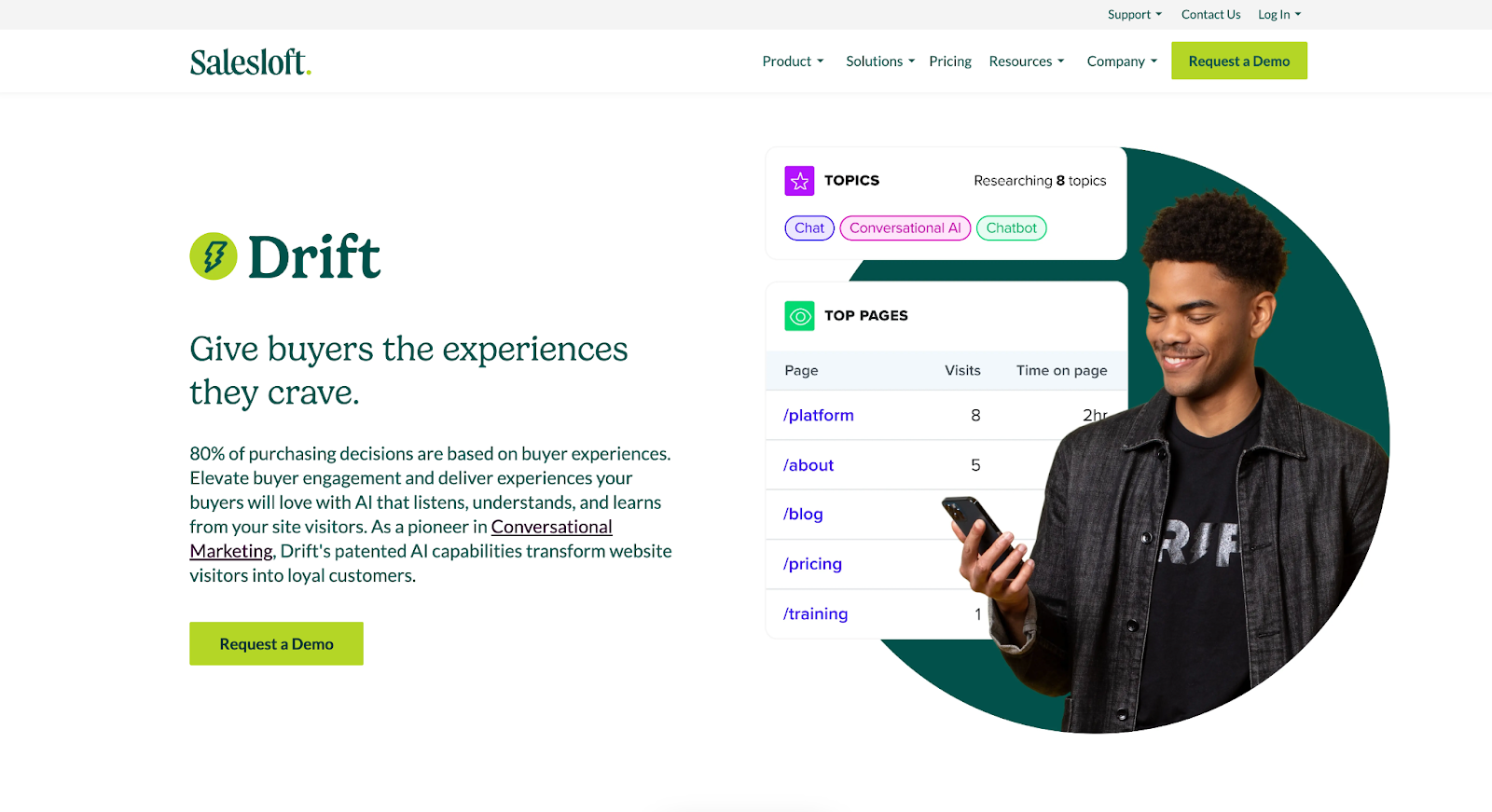
Drift is designed to maximize in-the-moment communication between companies and customers. With the help of its AI-powered chat function, you can interact with users right away and direct them through the sales funnel or answer their inquiries. Its ability to qualify leads through automated chats, acquire important data about possible clients, and guarantee that they’re sent to the appropriate person are some of its most beneficial features.
Drift also seamlessly connects with CRM programs like Salesforce, which expedites the sales process. Its automation playbooks lessen the need for manual involvement by helping businesses handle routine client inquiries like setting up demos or giving price details.
Pros:
- Advanced lead qualification features.
- Integrates with popular CRMs.
- Supports multi-channel communication.
Cons:
- Can be expensive for small businesses.
- Requires time to set up and customize properly.
Best For: Businesses focused on real-time lead generation and customer support across multiple touchpoints.
Pricing: Drift has three pricing plans: Premium, Advanced, and Enterprise, but It only displays the Premium option (which starts at $2,500/month billed annually), meant for small businesses.
9. iAdvize
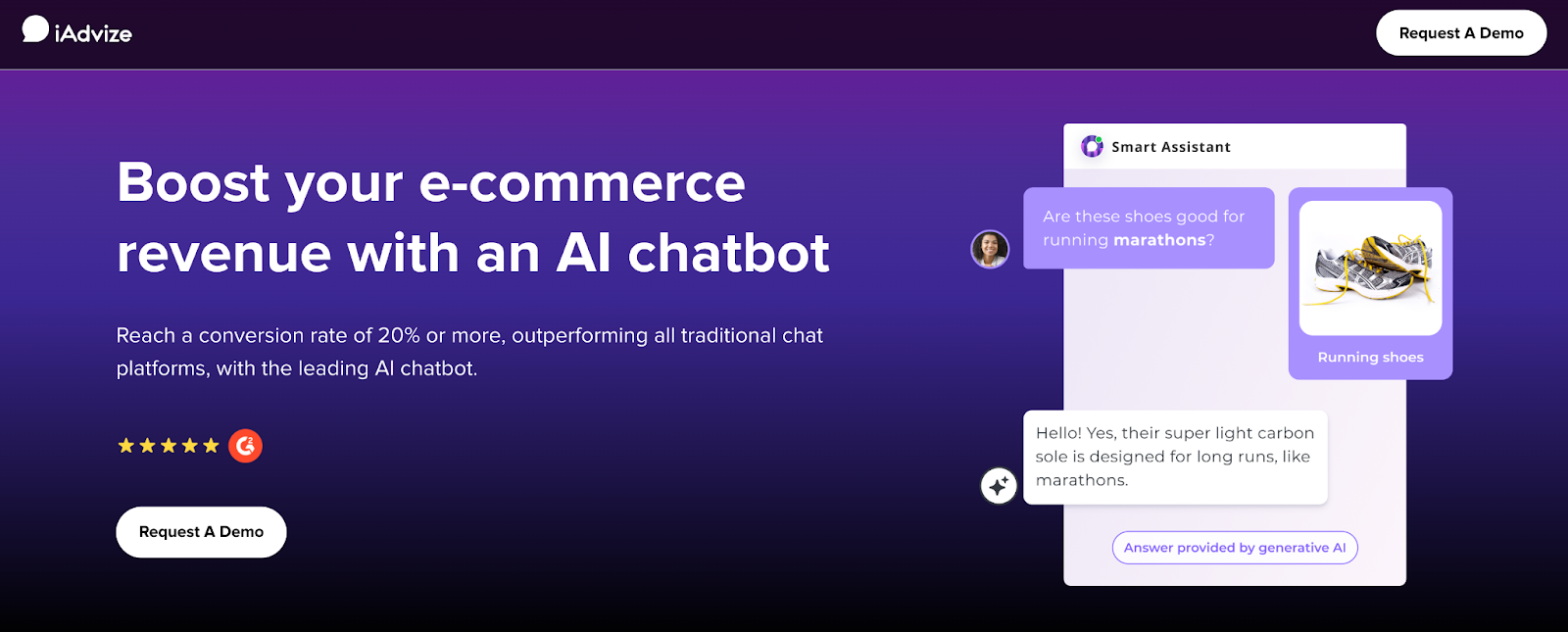
A conversational marketing platform with AI-driven chatbots that allow businesses to engage customers through personalized conversations; what sets iAdvize apart is its ability to combine human and automated interactions, connecting users with experts or influencers for tailored advice. Its AI can handle basic inquiries or transfer complex conversations to human agents, ensuring high-quality engagement.
iAdvize’s real strength lies in its focus on building trust through authentic conversations, often by connecting visitors with vetted professionals or product specialists.
Pros:
- Blends human and AI-driven support seamlessly.
- Focuses on expert-driven, personalized conversations.
- Strong in conversational marketing.
Cons:
- Can be costly for small businesses.
- Limited out-of-the-box integrations compared to some competitors.
Best For: Larger businesses or brands focused on high-quality, expert-driven conversational marketing.
Pricing: $850 per month billed annually. Also offers custom options with different features changing the prices.
10. Gorgias
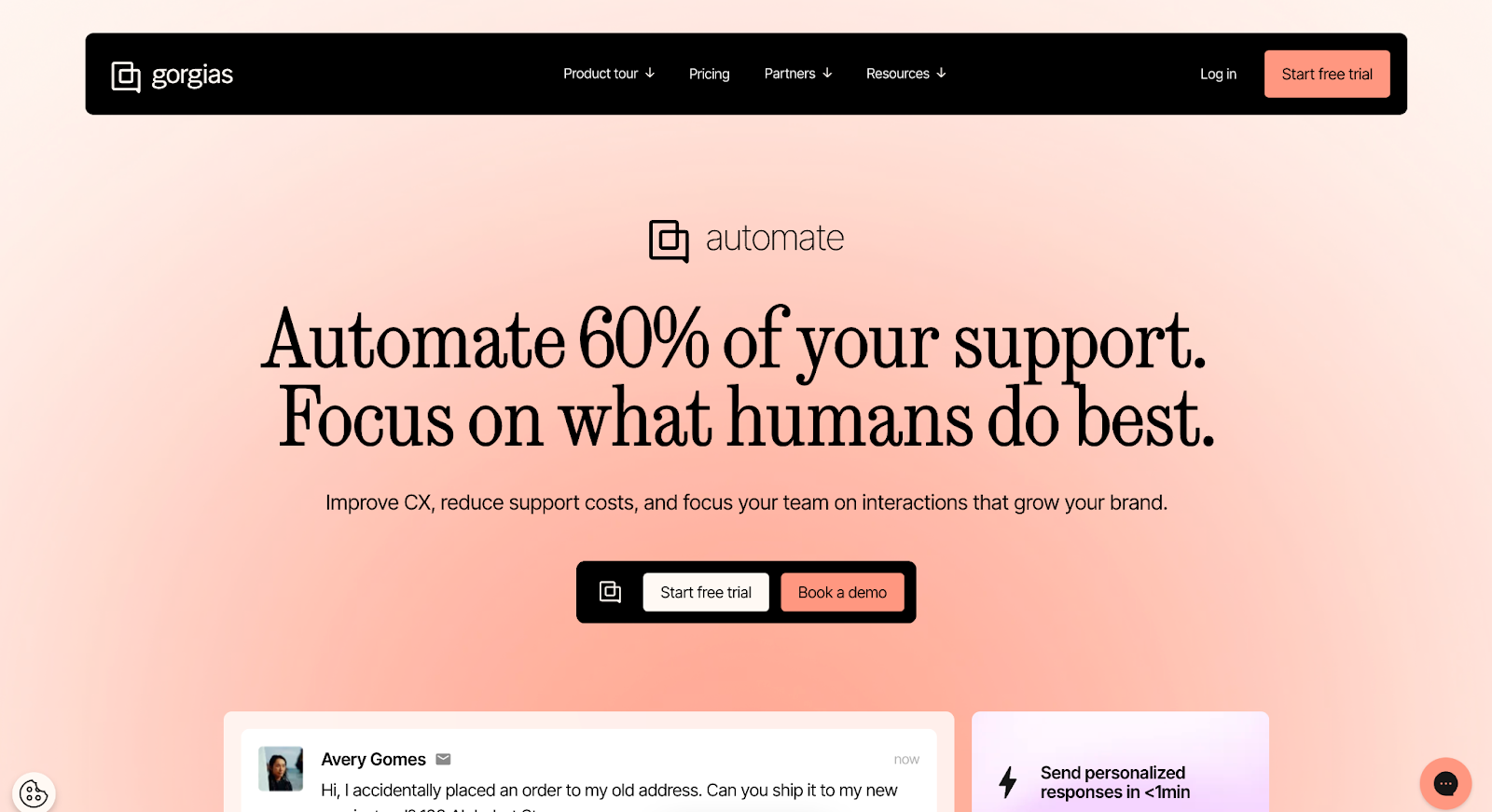
Gorgias is an AI-powered helpdesk platform designed specifically for ecommerce businesses. Its chatbot functionality excels in managing customer support queries by automating responses for common issues like shipping updates, order tracking, and returns.
Being easily integrated with ecommerce platforms like Shopify, Magento, and BigCommerce, one of Gorgias’ key strengths is its ability to manage support across multiple channels, including email, social media, and live chat.
Pros:
- Perfectly tailored for ecommerce businesses.
- Strong integrations with ecommerce platforms.
- Omnichannel support.
Cons:
- Higher-tier pricing can be expensive for smaller shops.
- Lacks some advanced AI customization compared to competitors.
Best For: ECommerce businesses looking to centralize customer support across multiple channels with strong platform integrations.
Pricing: Gorgias pricing starts at $10/month for the Starter plan and scales based on the number of support tickets handled, with higher-tier plans for larger businesses.
11. Ada
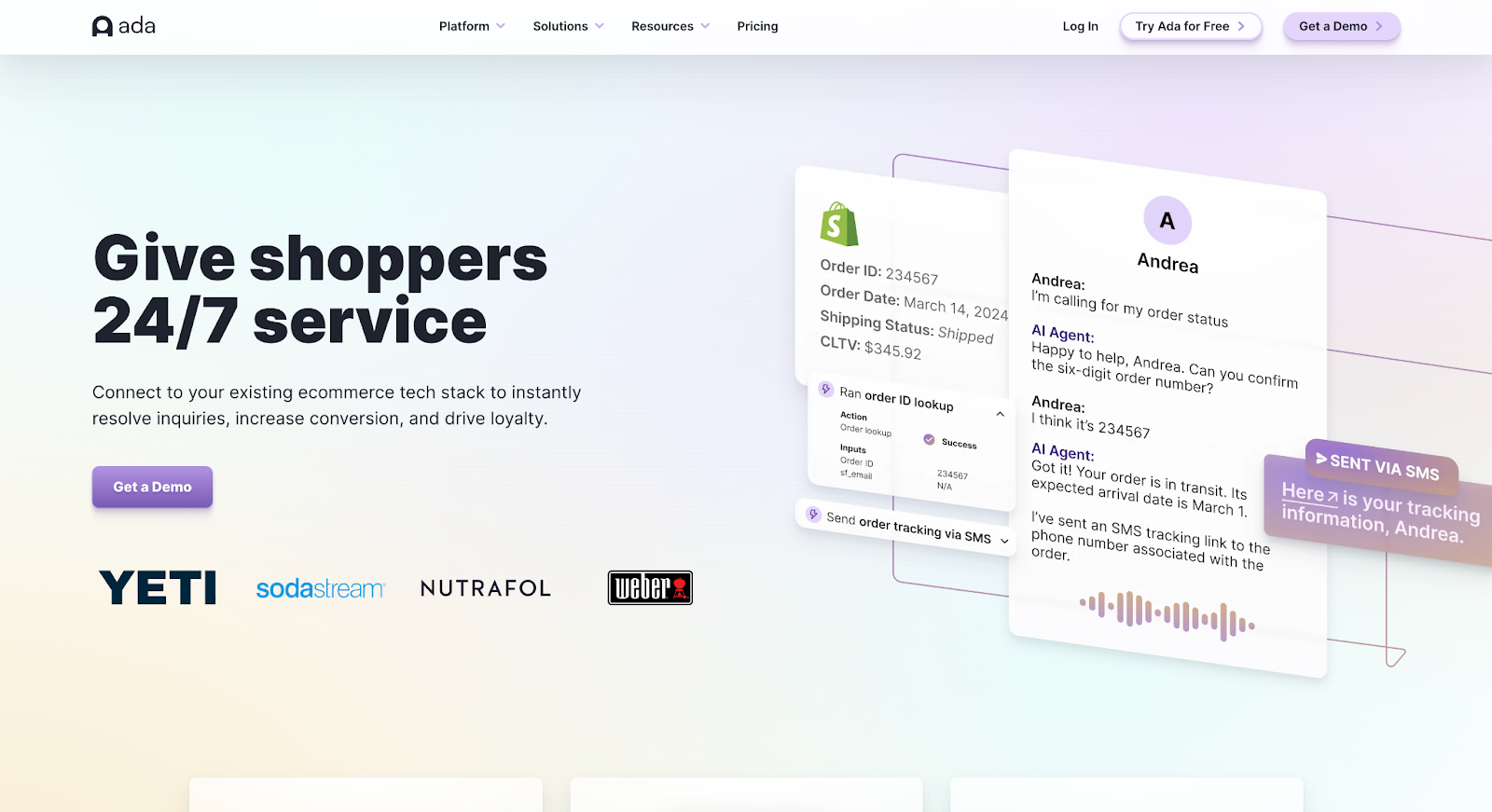
Ada is ideal for automating customer service at scale. Its strength lies in its ability to handle complex customer interactions providing businesses with a customizable chatbot that can handle everything from FAQs to more intricate customer service requests, reducing the need for human intervention.
Ada’s easy-to-use platform allows non-technical teams to build automated workflows and personalize interactions based on customer data. Also, it integrates with popular CRM and support tools, which helps keep conversations relevant and contextually aware.
Pros:
- Powerful AI and NLP capabilities.
- Easy-to-customize workflows for non-technical users.
- Scalable to handle high volumes of queries.
Cons:
- Pricing can be prohibitive for smaller businesses.
- Requires time and resources for optimal customization.
Best For: Large enterprises needing scalable, AI-driven customer service automation with advanced customization options.
Pricing: Ada offers custom pricing based on the business size and the complexity of chatbot requirements. It typically caters to medium to large businesses.
The Importance of AI Chatbots for Ecommerce
Roughly 1.5 billion people are using chatbots (according to Tidio) to ask questions, check purchases, or ask for suggestions for new products. This confirms the fact that, today, AI chatbots have become an essential tool for ecommerce businesses, providing several benefits that enhance both customer experience and operational efficiency.
They Can Enhance Customer Service
One of the most significant aspects of AI chatbots in ecommerce is their role in enhancing customer service. In addition to offering 24/7 availability, chatbots can handle multiple customer inquiries simultaneously, allowing businesses to space their customer service efforts without needing to hire additional staff.
They Can Drive Sales and Reduce “Cart Abandonment”
In addition to improving service, AI chatbots are vital for driving sales. Through personalized interactions, chatbots can recommend products based on customer preferences, browsing history, or previous purchases. This kind of engagement not only improves conversion rates but also increases average order value as customers are presented with more relevant products.
By doing this, chatbots reduce friction and help prevent cart abandonment (when buyers abandon a purchase at the last minute), which is a common challenge for ecommerce businesses.
They Can Be a Cost-Effective Option for Small Businesses
By automating tasks such as answering FAQs, processing returns, or providing shipping updates, AI chatbots can reduce the need for large customer service teams. This helps small online businesses save on operational costs while maintaining a high level of service.
Additionally, by handling these repetitive tasks, chatbots free up human employers to focus on more complex interactions, improving the overall efficiency of a business.
They Can Provide Insights Into Customer Behavior
By analyzing conversations, chatbots can provide insights into customer behavior, helping businesses identify common pain points, frequently asked questions, or even what are popular products among buyers.
This data can be used to improve services, optimize marketing strategies, refine product recommendations, and personalize future interactions, leading to more successful sales outcomes.
Launch Your Ecommerce Business with Whop
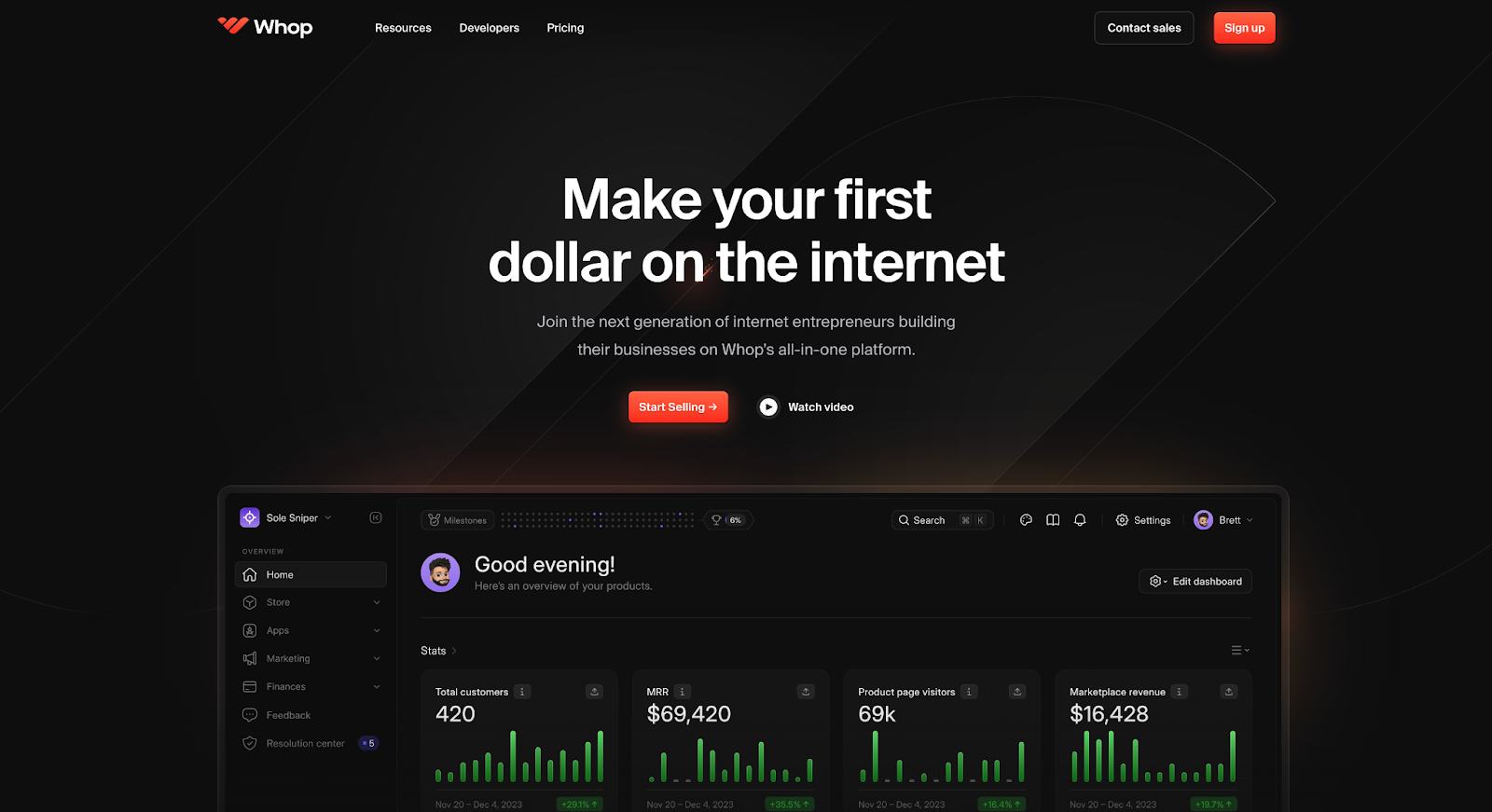
AI chatbots are a great tool that streamline tasks and open up endless possibilities for launching your online business. However, when it comes to engaging with customers and driving sales, you need an ecommerce platform that truly delivers, and that’s where Whop comes in.
Whether you're selling digital products like online courses, downloadables, ebooks or community subscriptions, Whop is the ultimate destination for online entrepreneurs to transform their passion into profits. Our platform manages everything from payment processing and customer support to digital delivery and more.
Whop provides all the tools you need to succeed and only make money when you make money, with no subscription fees. Join today and take your business to the next level.
The best AI Chatbots for ecommerce in 2026 FAQs
Frequently asked questions about the best AI Chatbots for ecommerce in 2026.
Are AI Chatbots Expensive To Use?
The cost of using AI chatbots varies depending on the platform and the features you need. Some offer free basic plans or pay-as-you-go options, while others charge a monthly fee. Many chatbots are cost-effective for small businesses, with pricing that scales as your business grows.
How Can AI Chatbots Help Increase Sales?
AI chatbots boost sales by engaging customers with personalized product recommendations, answering their questions instantly, and guiding them through the purchase process. They also follow up with abandoned carts, leading to more completed transactions.
Can AI Chatbots Handle Customer Service for My Online Store?
Yes, AI chatbots are designed to handle a wide range of customer service tasks. They can answer FAQs, resolve issues, process returns, and provide order updates. By automating these interactions, chatbots reduce response times, offering immediate assistance that keeps customers satisfied while reducing the workload for human agents.
Why You Should Trust Us
Joe Niehaus is a seasoned content writer and ecommerce specialist at Whop, with extensive experience managing affiliate programs for a range of ecommerce brands. His expertise has been featured in leading publications like GQ, Travel + Leisure, and Business Insider.


